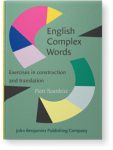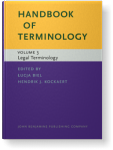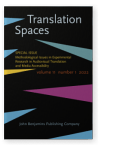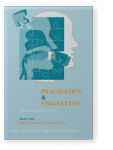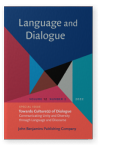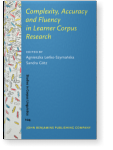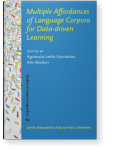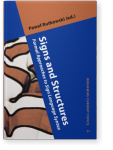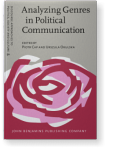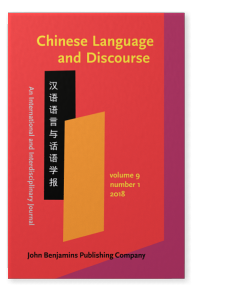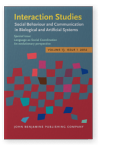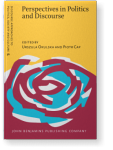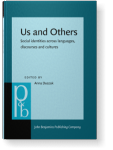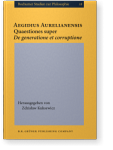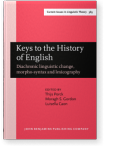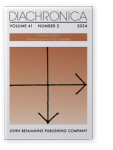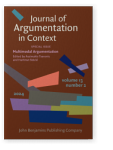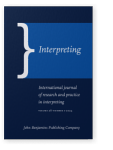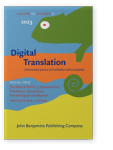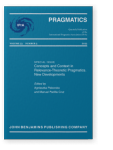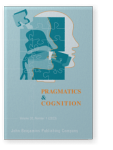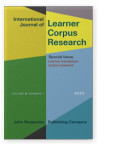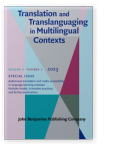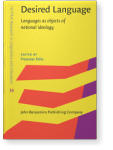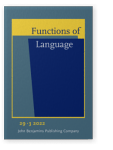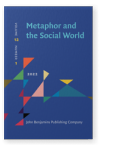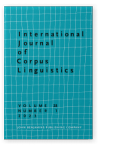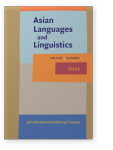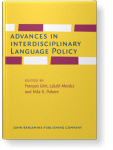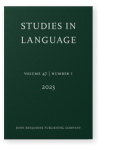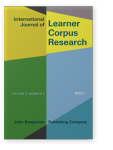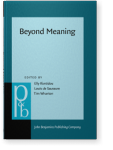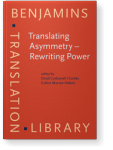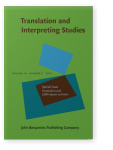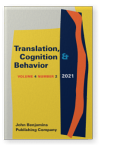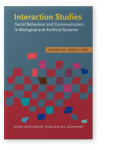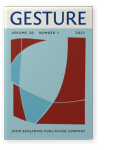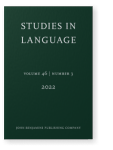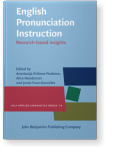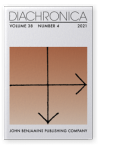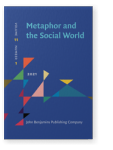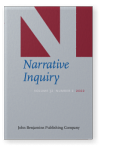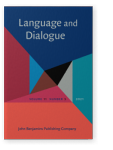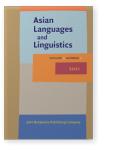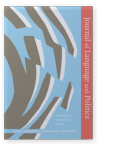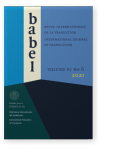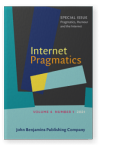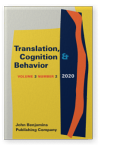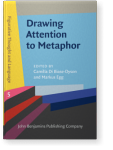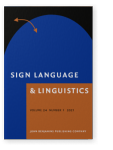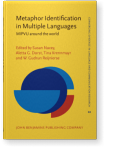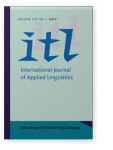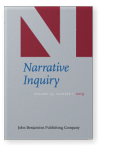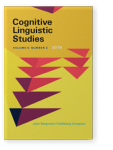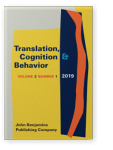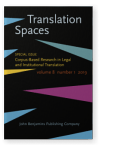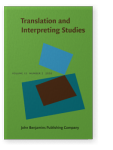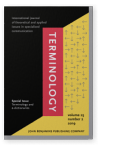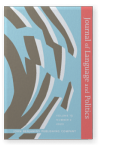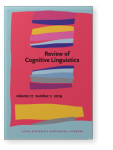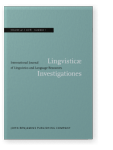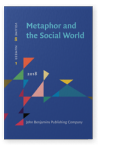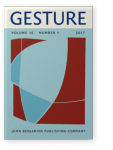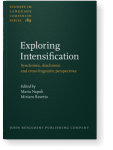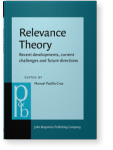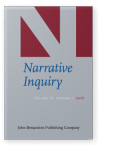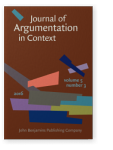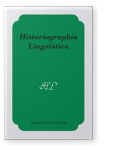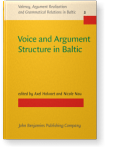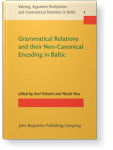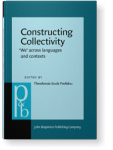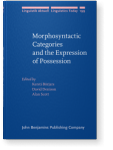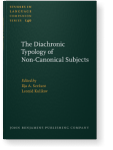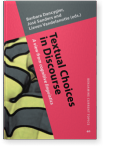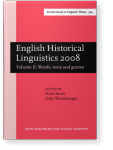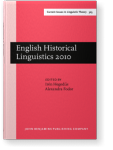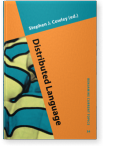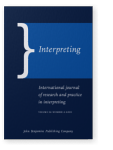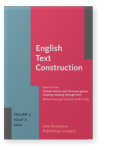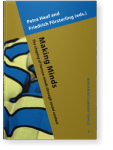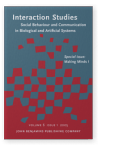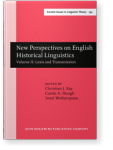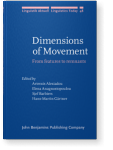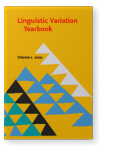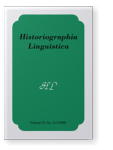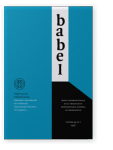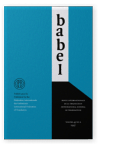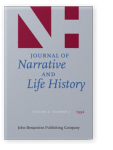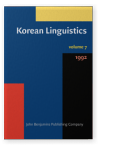University of Warsaw
List of John Benjamins publications for which someone affiliated with University of Warsaw plays a role.
Handbook of Terminology: Volume 3. Legal Terminology
Edited by Łucja Biel & Hendrik J. Kockaert
[Handbook of Terminology, 3] 2023. vii, 620 pp. + index | reference workSubjects Lexicography | TerminologyForensic & legal linguistics
Methodological Issues in Experimental Research in Audiovisual Translation and Media Accessibility: Special issue of Translation Spaces 11:1 (2022)
Edited by Gian Maria Greco, Anna Jankowska & Agnieszka Szarkowska
[Translation Spaces: A multidisciplinary, multimedia, and multilingual journal of translation, 11:1] 2022. | special issueSubjects Discourse studiesTranslation Studies
New Developments in Relevance Theory: Special issue of Pragmatics & Cognition 28:2 (2021)
Edited by Manuel Padilla Cruz & Agnieszka Piskorska
[Pragmatics & Cognition, 28:2] 2022. | special issueSubjects Cognition and language | Discourse studies | PragmaticsCognitive psychology
Towards Culture(s) of Dialogue: Communicating Unity and Diversity through Language and Discourse. Special issue of Language and Dialogue 12:2 (2022)
Edited by Urszula Okulska, Grzegorz Kowalski & Urszula Topczewska
[Language and Dialogue, 12:2] 2022. | special issueSubjects Applied linguistics | Cognition and language | Computational & corpus linguistics | Dialogue studies | Discourse studies | Pragmatics
Complexity, Accuracy and Fluency in Learner Corpus Research
Edited by Agnieszka Leńko-Szymańska & Sandra Götz
[Studies in Corpus Linguistics, 104] 2022. | edited volumeSubjects Corpus linguistics | Language acquisition | Multilingualism | Theoretical linguistics
Multiple Affordances of Language Corpora for Data-driven Learning
Edited by Agnieszka Leńko-Szymańska & Alex Boulton
[Studies in Corpus Linguistics, 69] 2015. vii, 312 pp. | edited volumeSubjects Applied linguistics | Corpus linguistics | Language teaching
Signs and Structures: Formal Approaches to Sign Language Syntax
Edited by Paweł Rutkowski
[Benjamins Current Topics, 71] 2015. v, 143 pp. | edited volumeSubjects Signed languages | Syntax | Theoretical linguistics
Analyzing Genres in Political Communication: Theory and practice
Edited by Piotr Cap & Urszula Okulska
[Discourse Approaches to Politics, Society and Culture, 50] 2013. xi, 426 pp. | edited volumeSubjects Discourse studies | Pragmatics
Sign Language Syntax from a Formal Perspective: Selected Papers from the 2012 Warsaw FEAST. Special issue of Sign Language & Linguistics 16:2 (2013)
Edited by Paweł Rutkowski
[Sign Language & Linguistics, 16:2] 2013. | special issueSubjects Signed languages | Theoretical linguistics
Language as Social Coordination: An evolutionary perspective: Special issue of Interaction Studies 13:1 (2012)
Edited by Joanna Raczaszek-Leonardi & Stephen J. Cowley
[Interaction Studies: Social Behaviour and Communication in Biological and Artificial Systems, 13:1] 2012. | special issueSubjects Artificial Intelligence | Cognition and language | Evolution of language
Perspectives in Politics and Discourse
Edited by Urszula Okulska & Piotr Cap
[Discourse Approaches to Politics, Society and Culture, 36] 2010. ix, 416 pp. | edited volumeSubjects Discourse studies | Pragmatics
Us and Others: Social identities across languages, discourses and cultures
Edited by Anna Duszak
[Pragmatics & Beyond New Series, 98] 2002. viii, 522 pp. | edited volumeSubjects Discourse studies | Pragmatics | Sociolinguistics and Dialectology
Aegidius Aurelianensis: Quaestiones super De generatione et corruptione
Edited by Zdzisław Kuksewicz
[Bochumer Studien zur Philosophie, 18] 1993. xxviii, 237 pp. | edited volumeSubjects Classical philosophy
2024 Loss of wiþer-words in English
In: Keys to the History of English: Diachronic linguistic change, morpho-syntax and lexicography. Selected papers from the 21st ICEHL[Current Issues in Linguistic Theory, 363] pp. 191–211
Keywords Old and Middle English lexis |
wiþer
| loss of words | corpus study | causes of demise
2024 Disappearing iconicity in the evolution of Polish Sign Language: The case of słodki ‘Sweet’
Keywords Polish Sign Language | PJM | linguistic evolution | sign language | assimilation | reduction | channel clearing | analogy
2024 How we argue about the use of images: Metavisual disputes in practice
Keywords metavisual dispute | multimodal argumentation | visual argumentation | viewer perspective | metalinguistic dispute
2023 Definitions in law across legal cultures and jurisdictions
Keywords legal definition | legislative drafting guidelines | legal terminology | normative text
2023 Variation of legal terms in monolingual and multilingual contexts: Types, distribution, attitudes and causes
Keywords variation | synonymy | legal terms | variant | translation | multilingual law
2023 An in-context overview of legal translator competences, qualifications and other professional requirements set in the
ISO 20771:2020
Legal translation – Requirements standard
Keywords legal translation | legal translator | translator competences and qualifications | ISO 20771 | ISO 17100 | EQF | translation best practice | requirements | CPD | ISO certification
2023 Non-literal uses of proper names in XYZ constructions: A relevance theory perspective
Keywords ad hoc concept | category extension | lexical pragmatics | metaphor | proper name | relevance theory | XYZ construction
2023 Terminological collocations in trainee and professional legal translations: A learner-corpus study of L2 company law translations
Keywords terminological collocations | legal phraseology | legal translation | L2 translation | learner translation corpus
2023 Reverse subtitles in foreign language learning: Noticing and memory
Keywords audiovisual translation | reverse subtitles | memory | noticing | eye tracking
2022 Derivation and semantic autonomy: A corpus study of Polish głowa “head” and its diminutive główka
Keywords cognitive linguistics | lexical semantics | head | Polish | polysemy
2022 Discourse approaches to the study of dialogue and culture(s)
Keywords discourse analysis | dialogue analysis | language use | action | meaning | context | unity | diversity
2022 Is it possible to prove the Altaic theory on the basis of negative forms in Mongolian, Manchu and Turkish?: Comparison of negative forms in Altaic languages – Part II*
Keywords Mongolic | Tungusic | Turkic | negative forms | historical linguistics | comparative linguistics | Altaic theory
2022 Cross-cultural dialogue in the Polish-English translation of neologisms: The case of science-fiction prose by Stanisław Lem
Keywords neologism | allusion | literary translation | dialogue | science-fiction | translation techniques
2022 Proximization and dialogue in Internet news texts and comments
Keywords proximization | dialogue | media discourse | online comments | Discourse Space | Romania | Poland
2022 Has madam read Wilson (2016)?: A procedural account of the T/V forms in Polish
Keywords politeness | T/V pronouns | procedural meaning | addressative forms | modularity | social cognition module
2022 Language simplification in endangered languages?: Inflectional categories of nouns and verbs in Eastern Huasteca Nahuatl and Wymysorys
Keywords language endangerment | complexity | simplification | Nahuatl | Wymysorys
2022 Using linear mixed models to analyze data from eye-tracking research on subtitling
Keywords eye tracking | subtitling | linear mixed-effects models | LMMs | traditional statistical methods | confounding variables | reading | audiovisual translation
2021
Humorous means, serious messages: A relevance-theoretic perspective on telling jokes to
communicate propositional meaning
Keywords humour | jokes | propositional meaning | fiction | allegory | metaphor | irony | emergent implicatures | propositional attitude
2021 EU institutional websites: Targeting citizens, building asymmetries
Keywords institutional translation | website localisation | institution-to-citizen communication | power | distance | translator’s agency | digital Eurolect | Polish Eurolect | institutional netspeak
2021 Accessing Bodies that Matter
: On queer activist practices of translation
Keywords queer translation | queer studies | Judith Butler |
Bodies that Matter
| Poland | gender
2022 Being ambivalent by exploiting indeterminacy in the explicit import of an utterance
Keywords indeterminacy | explicature | weak communication | non-propositional effects | affective response | pragmatic continua
2021 Effects of subtitle speed on proportional reading time: Re-analysing subtitle reading data with mixed effects models
Keywords subtitling | subtitle speed | eye tracking | proportional reading time | linear mixed effects models
2022 Interaction history as a source of compositionality in emergent communication
Keywords emergent communication | path-dependence | compositionality | Lewis signaling games | generalization
2021 Interactional gestures as soccer celebrations
Keywords non-verbal communication | gestures | celebrations | sport
2021 Through space, relations, and thoughts: The system of postpositions in Karijona (Cariban, Amazonia)
Keywords Amazonian languages | Cariban languages | Karijona | locative classifiers | mental states | grammar of space | morphosyntax
2021 Mobile apps for pronunciation training: Exploring learner engagement and retention
In: English Pronunciation Instruction: Research-based insights[AILA Applied Linguistics Series, 19] pp. 357–384
Keywords mobile apps | mobile-assisted pronunciation training (MAPT) | computer-assisted pronunciation training (CAPT) | technologies | pronunciation training | pronunciation apps | lifelong learning | learner retention | app retention | app engagement
2021 Loanwords vs relics: A new method in lexical borrowing studies exemplified by Yiddish-Slavic language contact
Keywords lexical borrowings | loanwords | lexical relics | Yiddish | Polish | language contact | substratum | adstratum
2021 Metaphors in Polish, English, Russian, and French perfumery discourse: A comparative study
Keywords metaphor | perfumery discourse | synesthesia
2021 Difficulties with telling the truth in non-fictive narratives and the issue of fictionalization
Keywords non-fictive narratives | fictionalization | narrative truth-telling | historical writing | alethic pluralism | discourse fictionalization strategies | trauma stories | narrative identity
2021 Identity, agency and intercultural dialogic competencies in L2 ultimate attainment
Keywords acculturation | identity | integration | near-native | ultimate attainment
2022 Is it possible to prove the Altaic theory on the basis of negative forms in Mongolian, Manchu and Turkish?: Comparison of negative forms in Altaic languages – Part I*
Keywords Altaic languages | negative forms | historical comparative linguistics
2021 The rise of the new Polish far-right: An analysis of Grzegorz Braun’s discursive strategies
Keywords Confederation Liberty and Independence | Grzegorz Braun | legitimation | multimodal discourse analysis | right-wing discourse
2021 Translating in a constrained environment: Shaping genres, audiences and attitudes anew
Keywords constraints | children’s literature | target audiences | genre | taboo | contraintes | littérature pour enfant | publics cibles | genre | tabou
2020 The internet and social media as a theme and channel of humor
Keywords cultural representations | incongruity | normative bias | private beliefs | phatic internet | relevance theory
2020 Tracking mental processes in sight translation: Neurobiological determinants of selected eyetracking parameters
Keywords sight translation | credibility of eyetracking parameters | long-term memory | spatial saccadic movements | pupil dilation | cognitive load
2020 In search of deliberateness in Maya glyphic texts
In: Drawing attention to metaphor: Case studies across time periods, cultures and modalities[Figurative Thought and Language, 5] pp. 189–206
Keywords Classic Mayan | cognitive linguistics | metaphor and metonymy | deliberate metaphor
2020 How do supranational terms transfer into national legal systems?: A corpus-informed study of EU English terminology in consumer protection directives and UK, Irish and Maltese transposing
acts
Keywords legal terms | supranational terms | autonomous legal concepts | EU terminology | transposition | directive
2019 Letter to a grandchild as a narrative tool of older adults’
biographical experience exploration
Keywords narrative approach | letter technique | biographical experience | wisdom transmission
2020 Narrative metaphors in Polish perfumery discourse
Keywords metaphor | narrative | perfume | olfactory perception
2019 Six-second rule revisited: An eye-tracking study on the impact of speech rate and language proficiency on subtitle reading
Keywords subtitling | six-second rule | reading speed | speech rate | audiovisual translation | eyetracking
2019 The formulaicity of translations across EU institutional
genres: A corpus-driven analysis of lexical bundles in translated and
non-translated language
Keywords institutional translation | EU translation | lexical bundles | corpus-driven | formulaicity | genre variation | institutional genres
2019 The lyric present in English translations of Russian poetry: A case study of English versions of Anna Akhmatova’s poems
Keywords lyric present | present progressive | Anna Akhmatova | poetic translation | time
2019 eLex2
: A prototype electronic dictionary application for legal translators
Keywords dictionary of law | legal lexicography | legal translation | terminography
2019 ‘Eastern Europe’ in the English-language press in the twentieth century: The term’s different kinds of otherness
Keywords Eastern Europe | press | discourse | the twentieth century | otherness
2020 The salience of local schemas in a productive word-formation process
Keywords word-formation | nominalization | suffixation | productivity | (local) schema
2018 The origin of the valency metaphor in linguistics
Keywords valency | Tesnière | Peirce | Jakobson
2018 “It’s like herding butterflies”: Simile-type comparisons and the interplay between similes and metaphors in radio discourse
Keywords simile | metaphor | radio talk | spoken discourse
2017 Learning in-progress
: On the role of gesture in microgenetic development of L2 grammar
Keywords Second Language Acquisition (SLA) | gesture | classroom | grammar instruction | Sociocultural Theory (SCT)
2017 What does reduplication intensify?: The semantics and pragmatics of reduplicated forms in Italian and their equivalents in German
In: Exploring Intensification: Synchronic, diachronic and cross-linguistic perspectives[Studies in Language Companion Series, 189] pp. 289–304
Keywords reduplication | intensification | modulation of affective intensity | implicatures | embodied communication
2016 Perlocutionary effects and relevance theory
In: Relevance Theory: Recent developments, current challenges and future directions[Pragmatics & Beyond New Series, 268] pp. 287–305
Keywords (non-)communicated speech acts | affective states | illocutionary force | perlocutionary effect | utterance interpretation
2016 Parents have lives, too!: Adolescents’ and early adults’ narratives about their parents
Keywords parents | adolescents | narrative development | life story
2017 The Katyń court case: Stories about history, politics, and words
Keywords legal reasoning | narration | argumentation scheme | legal argumentation | court dispute
2015 Introduction
In: Signs and Structures: Formal Approaches to Sign Language Syntax[Benjamins Current Topics, 71] pp. 119–123
2010 Interpreting in Nazi concentration camps during World War II
Keywords camp interpreter | concentration camp | registrar | messenger | German | camp officials | interrogation
2008 Dynamics of social coordination: The synchronization of internal states in close relationships
In: Making Minds: The shaping of human minds through social context[Benjamins Current Topics, 4] pp. 31–46
Keywords close relationships | control parameters | coordination | dynamical systems | dynamical variables | internal states | logistic equations | mutual influence | synchronization
2005 Dynamics of social coordination: The synchronization of internal states in close relationships
Keywords synchronization | dynamical systems | logistic equations | control parameters | dynamical variables | mutual influence | close relationships | internal states | coordination
